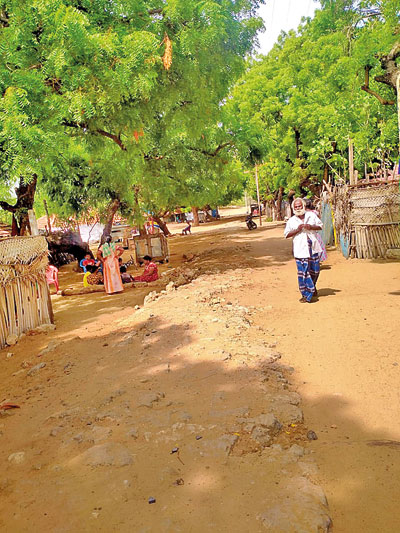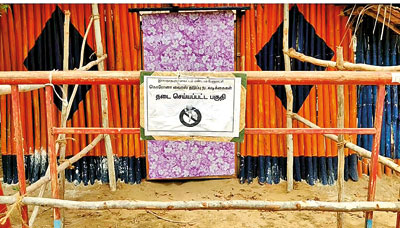News
As covid virus spreads in Tamil Nadu, more refugees from Sri Lanka want to come home

Refugee settlements within the Mandapam camp in Rameswaram
With India witnessing the worst phase of the global COVID-19 pandemic amidst life-threatening shortages of drugs, vaccines, oxygen, hospital beds and medical equipment, more and more Sri Lankan refugees are fleeing or want to flee the southern Indian state of Tamil Nadu by taking the illegal sea route to reach Sri Lanka.
The Sunday Times last week reported how a Sri Lankan refugee woman left her husband in Tamil Nadu and arrived in Sri Lanka together with her two sons in a boat operated by Tamil Nadu fishermen cum human smugglers to save herself and her two boys from the deadly virus.
The Sunday Times learns that so far more than a dozen Sri Lankans who fled to Tamil Nadu to escape the woes of the separatist war have come back to northern Sri Lanka after they undertook the illegal sea journey.
They were rounded up and sent to quarantine centres. Two of them tested positive.
Their test samples have been forwarded to COVID-19 testing laboratory at the University of Sri Jayewardenepura to determine whether they were afflicted with the Indian variant B.1.617.2 of the virus, according to a Northern Province health official.
One of those tested positive was a nine year-old boy. He was among the four people returned to Jaffna on Wednesday from the Mandapam refugee camp at Rameswaram in Tamil Nadu’s southern tip, taking the illegal sea passage. They found shelter in a Gurunagar residence. PCR tests showed that in addition to the boy, an elderly person from the household were infected with the virus.
The other infected person was a Jaffna trader. He flew to Tamil Nadu before Sri Lanka recorded a spike in the number of cases and imposed a travel ban from passengers from India. The trader paid a human smuggler Rs 100,000 for the trip back in a fishing vessel.
The boat was intercepted by a Sri Lanka Navy patrol. The trader was sent to a Karainagar quarantine centre where he tested positive. Four people, including the two skippers of the vessels, were taken into custody.
More than 75,000 Sri Lankan refugees are residing at seven refugee camps across Tamil Nadu. The number of people testing positive for the new variant of the virus is on the rise within the closely guarded Mandapam camp in Rameswaram, refugees alleged.

At a Tamil Nadu refugee camp, Indian health official makes an announcement regarding COVID health guidelines
Rajitha* (32), a Sri Lankan refugee from Trincomalee, fled to India in 2009. Speaking to the Sunday Times from the Mandapam refugee camp, she claimed refugees were being marginalised and discriminated against by health officials implementing the state government’s COVID-19 health initiatives. “There are no proper testing carried out inside the camp; neither are there adequate quarantine centres although the number of COVID cases are rising,” she said.
“As of now, 21 camp residents who tested positive for the virus have been isolated in small huts inside the camp. We came here to escape the war but now many of us want to return home rather than contracting the virus here and die in a pathetic condition,” said Rajitha, a mother of three young children.
She said she had registered with a local non-government organisation to return home legally with her family but the pandemic had disrupted her plans.

A COVID-19 quarantine hut set up within the Mandapam refugee camp
The state government provides dry rations to the refugees. In addition, it also gives them monetary assistance. The head of a refugee family receives INR 1000 (Rs 2,688) a month, other adults INR 750 (Rs 2000) each and children INR 400 (Rs 1075) each.
“This livelihood allowance is not enough to feed the family as the cost of living has been skyrocketing following the outbreak of the pandemic. My husband works as a labourer to support the family. I have pawned the jewellery I brought from Sri Lanka to support the family over years. There is no way for us to survive other than returning home,” Rajitha said.
Even Tamil Nadu political parties which cried for equal rights for Tamils in Sri Lanka turned a blind eye to the hardships faced by the Lankan refugees, said another refugee, stressing that they visit them only during election campaigns.
Early this week, Vidhuthalai Chiruthaigal Katchi (VCK) leader D. Ravikumar sought immediate medical intervention for the Sri Lankan refugees in Thumbalahalli camp in Dharmapuri, Tamil Nadu.
According to a post published on his official Facebook page, he had written to the Indian authorities to ensure that medical facilities were provided to Sri Lankan refugees who tested positive. Two refugees tested positive were critically ill, he pointed out.
Meanwhile, Sri Lanka Navy said that as part of its measures to prevent the new Indian variant of the COVID virus from entering Sri Lanka, it had stepped up around-the-clock patrols along the International Maritime Boarder Line (IMBL) and was cracking down on Indian vessels engaged in human smuggling.
The Navy is also carrying out awareness programmes in coastal areas of the North, urging the residents to be vigilant regarding the possible arrivals of illegal immigrants and inform the authorities if any suspicious activity is observed in their neighbourhoods.
(* Name was changed to protect the person’s identity.)
(Additional reporting by
N. Lohathayalan)


